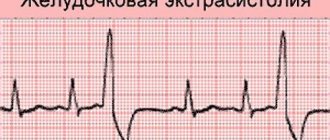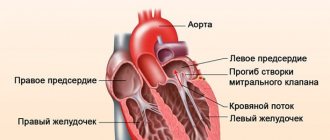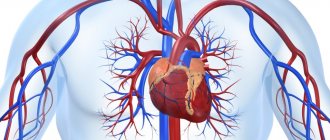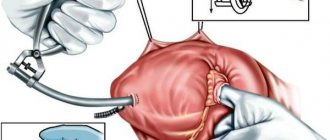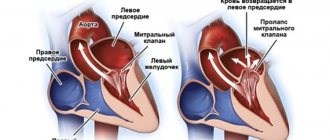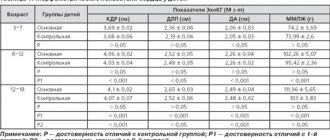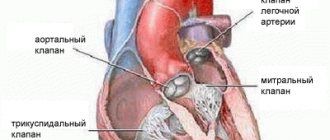In practice, it can be difficult to resolve the issue of conscription into the army with prolapse.
Should a conscript serve if he is diagnosed with mitral valve prolapse? We invite you to take a closer look at this issue.
Depending on what stage of the disease is established, the military medical commission can establish different categories of fitness for a conscript during the process of conscription activities. We will tell you which cases with diagnosed prolapse are eligible for conscription, and what points lawyers recommend paying attention to if a conscript intends to obtain a military ID due to his illness.
Find out if there are grounds for exemption from the army
Find out if you are fit to join the army with our test.
Take the test ~ 1 minute
Causes of MVP
Reasons include:
- Occupational hazards;
- Unfavorable environmental conditions;
- Possible genetic predisposition;
- Connective tissue pathologies;
- Pathologies of the chords of the heart.
Main clinical manifestations:
- Palpitations and interruptions in heart function;
- Tachycardia;
- Presence of shortness of breath during physical activity;
- Fatigue and weakness.
- Fainting is possible.
What is taken into account during the examination
Members of the IHC, when assigning a fitness category, are guided by three main criteria:
- severity of deviations in heart rhythm;
- the presence of a condition that differs from the norms of blood conductivity;
- diagnosed heart failure.
The last factor is quite significant. Experts focus on the gradation of functional classes:
- FC I – the conscript’s condition does not require restrictions on physical activity, since signs of deviations are not present at its usual level;
- FC II - increased heart rate, weakness and shortness of breath occur during standard exercise, but are no longer present at rest;
- FC III – symptoms are provoked by even a weak level of physical activity;
- FC IV – signs of the disease are present even at rest.
PMC degrees
Depending on the severity of the valve leaflet defect, prolapse can be:
1st degree – sashes deflection from 3 to 5.9 mm. The closure of the valves is complete, as a result of which symptoms may not appear;
2 degrees – from 6 to 8.9 mm. The leaflets do not fit tightly, there is regurgitation (backflow of blood from the ventricle into the atrium);
3 degrees – from 9 mm or more. The valves are not adjacent to each other, and acute left ventricular failure may occur.
Each degree has its own severity of regurgitation:
1st degree – a slight wave of reverse blood flow at the level of the valves;
2nd degree – moderate regurgitation with a wave rising to the middle of the left atrium;
3rd degree – a pronounced wave of backflow of blood to the middle of the left atrium;
Grade 4 – severe, the wave of regurgitation reaches the opposite end of the atrium.
What is the danger of this pathology?
Prolapse can contribute to the development of serious disorders in the functioning of the cardiovascular system and the entire body as a whole.
Before considering the possibility of service with this disease, you need to understand: what is the hidden danger and what happens in the heart during prolapse?
The valves regulate the flow of blood in the cavity of the heart, as a result of which the reverse flow of blood becomes impossible. When the mitral valve is open, blood flows under pressure from the left atrium into the ventricle. After all the blood has been ejected into the ventricle, the valve closes, and blood flows from the cavity of the left ventricle into the aorta to supply oxygen and nutrients to the whole body. If the valve sag, some blood may flow back into the atrium.
Mitral valve prolapse and the army
What are the general eligibility categories?
- G - fit for service;
- GO - fit for service with minor restrictions;
- VN - temporarily unusable;
- GPS - unfit for service in peacetime;
- NGI - unfit for service with exclusion from military registration;
- State Tax Service - fit for service outside the formation in peacetime
- IND – fitness category determined individually for a conscript
Mitral valve prolapse refers to article 42 or 80 of the schedule of diseases, depending on the cause of occurrence, from which it follows:
- A conscript with grade 3 or 2 MVP with impaired intracardiac hemodynamics receives the NGI fitness category.
- In case of grade 2 MVP without disturbance of intracardiac hemodynamics and grade 1 with regurgitation of grade 2 or more, the CGM suitability category is assigned.
- The GO suitability category includes grade 1 MVP without disruption of intracardiac hemodynamics and with grade 1 regurgitation.
To confirm the diagnosis and fitness category, the conscript should contact a specialist.
Physical restrictions and loads during MVP
A mitral valve defect in itself is not a contraindication to physical activity and sports. It all depends on the degree of regurgitation, the presence of signs of chronic heart failure (CHF), cardiac arrhythmias, and episodes of loss of consciousness.
All people with MVP with stage I regurgitation are prohibited from the following physical exercises:
- boxing;
- sports that require jerking movements - javelin or discus throwing, shot put, wrestling, jumping;
- lifting weights.
Types of sports and physical exercises that are allowed for MVP with I degree of regurgitation:
- Athletics;
- sport swimming;
- exercise in the gym - lifting weights not exceeding your own body weight is recommended. Preference should be given to aerobic exercises (cardio exercises);
- dance training - only those types of dance are allowed that do not involve lifting a partner;
Sports allowed for stage II regurgitation:
- table tennis;
- figure skating (without lifting your partner and sudden jumps);
- swimming (amateur);
- gymnastics;
- a ride on the bicycle.
Any type of sport and physical activity (except physical therapy) is strictly prohibited in the following situations:
- mitral regurgitation degree III;
- pain in the heart area;
- there are serious heart rhythm disturbances: prolonged QT interval, paroxysmal tachycardia, atrial fibrillation, frequent polytopic extrasystoles;
- the presence of signs of congestive heart failure - swelling in the legs, heaviness in the right hypochondrium, difficulty breathing during physical work;
- there were episodes of loss of consciousness (fainting).
For patients with the above symptoms, intense physical activity can sharply worsen their health and cause dangerous complications, which without urgent medical intervention can end very badly.
As for physical therapy (physical therapy), it will be useful for patients with any degree of mitral regurgitation. These exercises are based on increasing endurance and aerobic reserves of both the whole body and the heart.
- high raises of bent legs;
- circular movements of the arms forward and backward;
- circular movements of the hips;
- body turns;
- walking or running slowly.
General recommendations for exercise therapy classes:
- Maintain a moderate pace of movements.
- Breathing should be smooth.
- The duration of one workout should not exceed 30 minutes.
- The total training time per week is about 150 minutes.
- During exercise, you need to monitor your heart rate. It shouldn't be too high. Calculating the limit that cannot be exceeded is quite simple - you need to subtract your age from 200. If the pulse is higher than this value, you should take a short break (1-2 minutes) and continue at a more relaxed pace.
How can we help?
Often conscripts do not know their illnesses, where to go and where to be examined in order to confirm diagnoses and have the right to a deferment or exemption from the army. We employ specialists with extensive positive experience and this is confirmed by reviews from our clients. We guarantee qualified assistance, advice and support from specialists until you receive a military ID or a refund of 50% of the cost of services in the event of a different decision by the draft commission.
You study, work, you have many plans for life. Are you worried about your career or further studies? Are you a law-abiding citizen, but do you think that military service could worsen your health? Contact us and, if you have the right not to serve, we will help you prove it!
Medical examination at the military registration and enlistment office
The physical and emotional stress of military service can lead to significant deterioration in health. Young people must provide a package of medical documents confirming the presence of the disease or verbally voice complaints about their health. Obtain a deferment from conscription from the military registration and enlistment office for additional examination. The diagnosis is confirmed by clinical data and echocardiography results.
What is included in the package of documents: - an outpatient card with data on a visit to a cardiologist; — echocardiogram (displacement of the mitral valve leaflets, thickening ≥ 5 mm); — an extract from the medical history with a confirmed diagnosis.
The conscript has the right to challenge the conclusion of the medical commission at the military registration and enlistment office (Federal Law “On Military Duty and Military Service”, paragraph 7, Article 28). If you disagree with the assigned category, you should file a complaint with a higher organization (city or regional military registration and enlistment office) and file a claim in court. It is important to collect all the necessary documents and complete them correctly. A lawyer can represent the interests of the plaintiff in court. You can sign up for a free consultation with specialized lawyers in Perm by calling
Passing a medical examination
During the medical examination, all members of the draft commission closely monitor the conscripts and try to understand whether they are avoiding service by inventing various illnesses for themselves. But young men diagnosed with MVP deserve special attention, because the pathology is quite serious and poses a great threat to humans.
During the medical examination, the conscript is examined by a cardiologist and, if there is a heart murmur, he is sent for ultrasound diagnostics to identify the disease and the degree of its development.
When assigning a fitness category, the military commission is guided by the presence of a heart rhythm disorder, and the class of heart failure is also determined. There are only four of them:
- First grade. The pathology does not affect life in any way and shortness of breath or weakness does not occur during physical activity;
- Second class. With little physical activity, shortness of breath occurs, but with rest it disappears;
- Third class. Shortness of breath and rapid heartbeat occur even with little physical activity;
- Fourth grade. Shortness of breath is present even at rest.
A conscript must undergo a military medical commission, which consists of two stages:
- Medical examination;
- Final commission.
During the first stage, the young man undergoes blood and urine tests, fluorography and electrocardiography. After this, an examination is carried out by a psychiatrist, neurologist, psychiatrist, therapist, dentist, ophthalmologist, cardiologist and surgeon.
A visit to a therapist is the last thing a young person does. It is he who, based on all the records from other specialists, decides on the need to undergo additional medical examination and determines the appropriate fitness category.
If the cardiologist has recorded the detection of auscultatory signs of prolapse, then a referral for echocardiography and Holter ECG monitoring is additionally issued, which will more accurately determine the severity of the disease and only after that it will be possible to determine for sure whether a particular conscript with mitral valve prolapse will be accepted into the army or not. .
It is also worth considering that the commission takes into account not only the young person’s diagnosis itself, but also the presence of accompanying symptoms. If there are no complaints of poor health, then the decision of the commission on conscription will be positive.
With the first degree of pathology, the conscript will have to work hard to prove his unsuitability. In this case, symptoms such as dizziness, heart pain, and shortness of breath should be present, which does not occur often with this degree of the disease. Also, over a certain period, patients must contact specialists with this problem at least once every three months, have certificates in hand about visiting doctors and conducting examinations.
If a military commission diagnoses “first degree prolapse with heart failure,” which is just beginning to develop, then the conscript has no chance of being released from the army.
